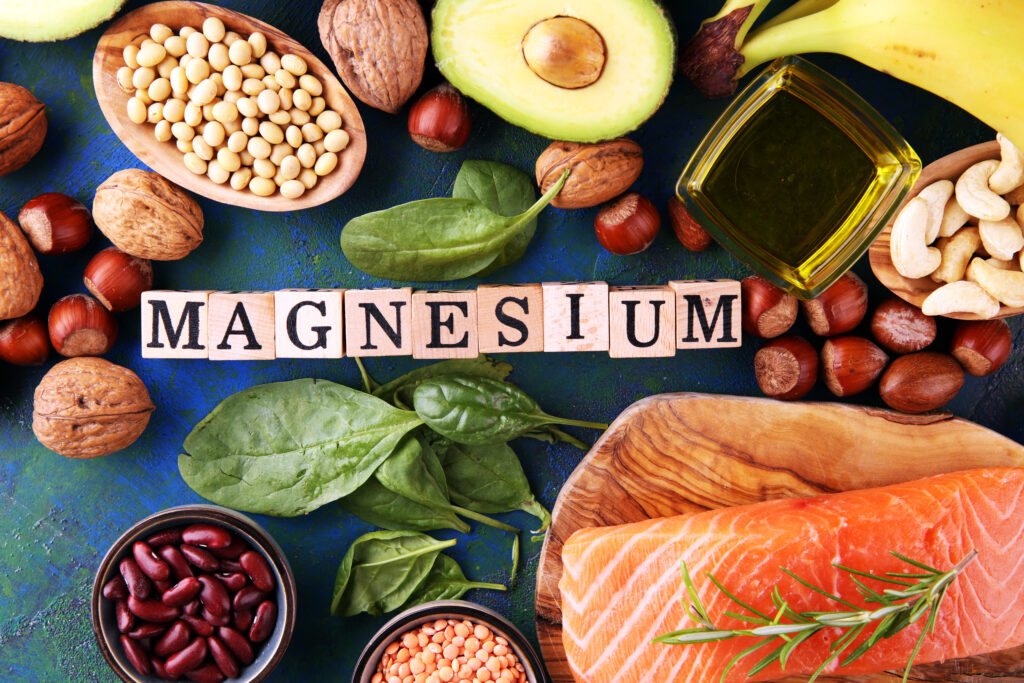
By Ali Bockelmann
The Role of Magnesium
Magnesium (Mg) is the eighth most abundant element, the third most plentiful element dissolved in seawater, and the fourth most abundant in human cells.[1] Magnesium is a vital mineral to our bodies and in fact, it’s a cofactor for over 300 enzyme reactions in the body.
Some of the processes in which magnesium is a cofactor include but are not limited to, protein synthesis, cellular energy production and storage, reproduction, DNA and RNA synthesis, and stabilizing mitochondrial membranes. Magnesium also plays a critical role in nerve transmission, cardiac excitability, neuromuscular conduction, muscular contraction, vasomotor tone, blood pressure, glucose, and insulin metabolism. Because of magnesium’s many functions within the body, it plays a major role in disease prevention and overall health. Low levels of magnesium have been associated with a number of chronic diseases including migraine headaches, Alzheimer’s disease, cerebrovascular accident (stroke), hypertension, cardiovascular disease, and type 2 diabetes mellitus. [2]
Magnesium is essential for our well-being. It is needed for immune health, sleep and recovery, circulation, hormone balancing, metabolism, bone health, and more! It increases the bioavailability of calcium, helps make proteins, and ensures proper vitamin D absorption.
Why are we deficient?
Many people are deficient in magnesium. It is estimated that up to 80% of us are. Even with a healthy diet, it can be difficult to get what we need from food alone. Due to most of our lifestyles, the magnesium that we do get in our day-to-day lives gets depleted. Did you know you lower your levels with things like lack of sleep, too much stress, alcohol, sugar consumption, and caffeine? Some medications also deplete your levels such as birth control. A long time ago, this wasn’t so much an issue but now, even our natural resources are getting depleted too. Due to over-farming and high pesticide use, magnesium levels in soil are decreasing too. Water sources aren’t the greatest at providing magnesium anymore either:
Fluoride in drinking water binds with magnesium, creating a nearly insoluble mineral compound that ends up deposited in the bones, where its brittleness increases the risk of fractures. Water, in fact, could be an excellent source of magnesium—if it comes from deep wells that have magnesium at their source, or from mineral-rich glacial runoff. Urban sources of drinking water are usually from surface water, such as rivers and streams, which are low in magnesium. Even many bottled mineral waters are quite low in magnesium, or have a very high concentration of calcium, or both. [3]
Where can you get magnesium?
The ocean is still a great source of magnesium so if you live close to a beach, you are in luck! However, that is not the case for most of us so finding a way to supplement and add magnesium to your diet is needed. While we can’t get enough from diet alone, magnesium in your diet is a good place to start. Spinach, almonds, avocados, bananas, dark chocolate, and especially nettles are good sources. When dealing with a deficiency, however, like most of us are, supplementation is usually recommended as it can be harder to raise your magnesium through diet alone.
Supplementation
Magnesium supplements are absorbed by the digestive system, and unfortunately, magnesium doesn’t absorb that well. On top of the fact we don’t absorb 100% of our supplements anyway, it can be even more difficult to absorb if your body isn’t set up for success to properly for optimal absorption. There can be several factors that affect your absorption but poor gut health and being low in vitamin D are some common ones we see. Another consideration is the type of magnesium you supplement with. Some people find it hard on their digestive tract when taking magnesium through supplements internally so understanding which one is best for you is helpful. Another option is topical magnesium. This is one of my favorite ways to get additional magnesium. It can be an effective way to increase your levels by bypassing your digestive system and kidneys, making it more readily available to the body. I often find using a combination of magnesium with different applications helpful in restoring our levels and allowing for maximum absorption.


